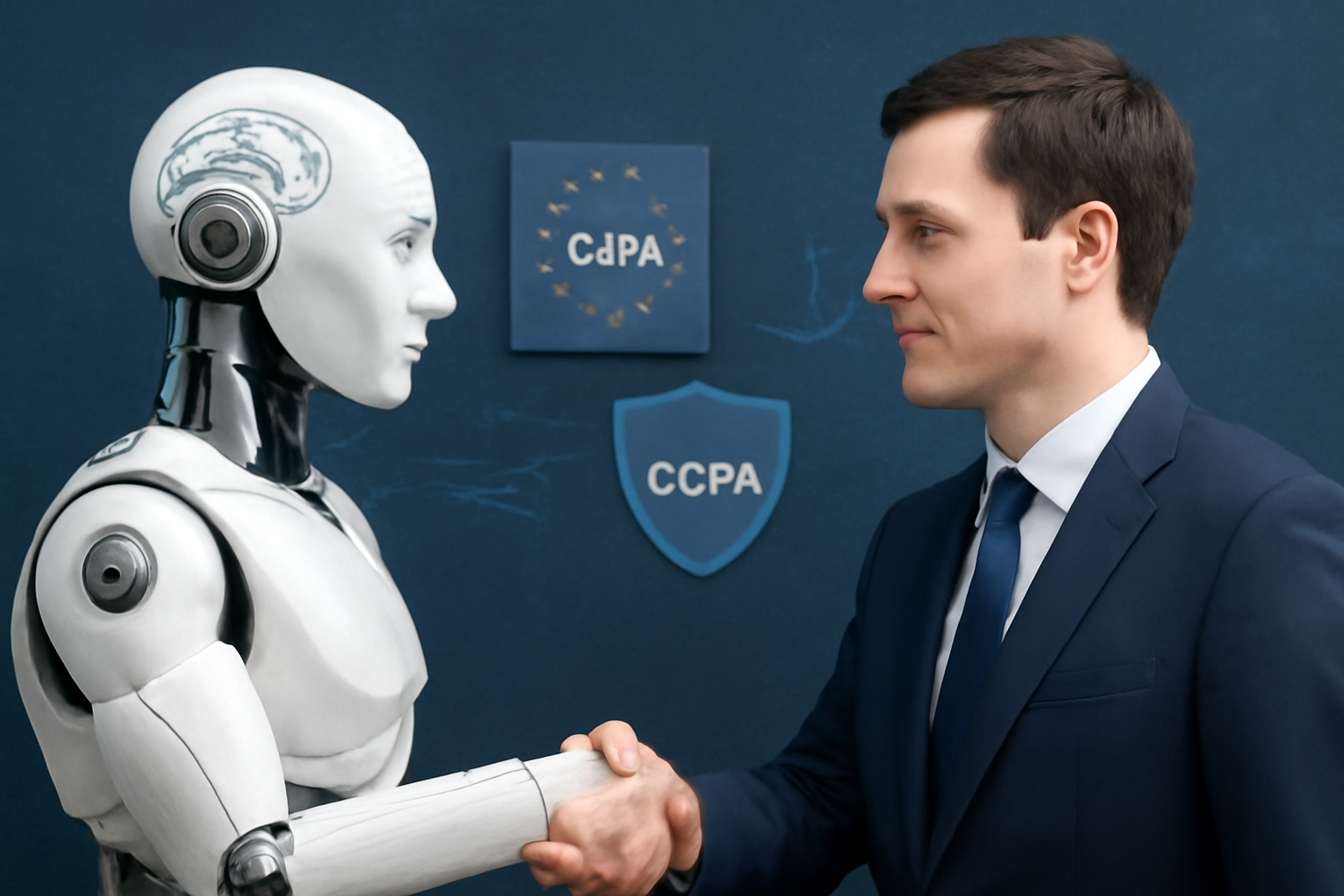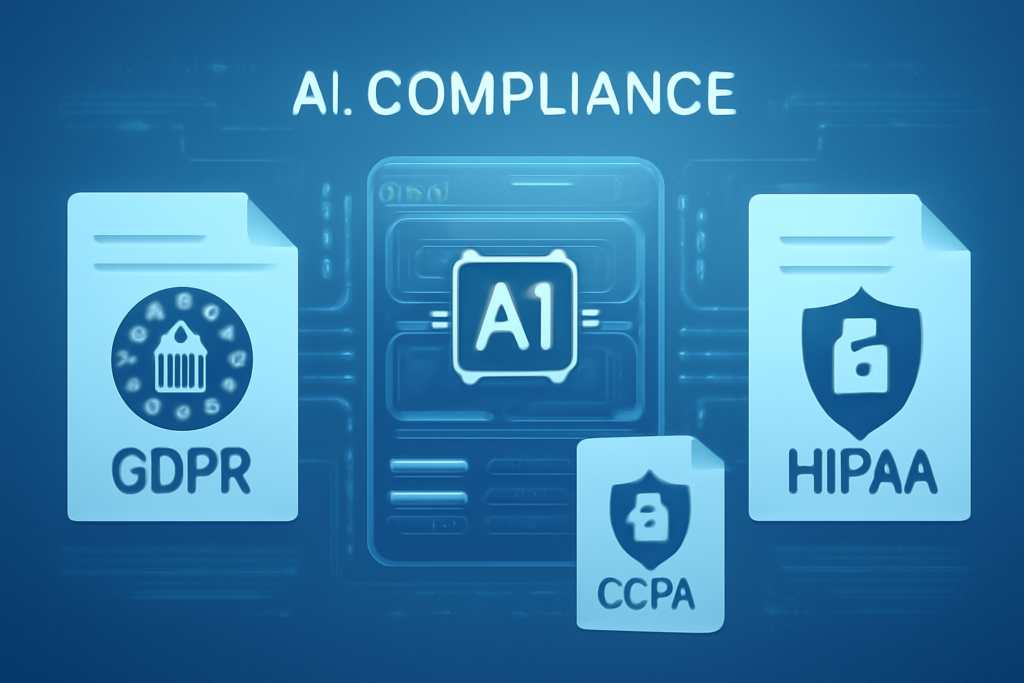Physical Address
304 North Cardinal St.
Dorchester Center, MA 02124
Physical Address
304 North Cardinal St.
Dorchester Center, MA 02124

Have you ever wondered how businesses ensure their different machine learning and AI tools are following the rules? As AI and machine learning continue to grow and impact industries like healthcare, finance, and retail, companies are facing pressure to comply with regulations like GDPR (General Data Protection Regulation) and CCPA (California Consumer Privacy Act). These regulations on artificial intelligence are designed to protect personal data and privacy, making it important for AI systems to handle data responsibly. In 2025, making sure AI systems are compliant with these regulations is more important than ever.
AI compliance software is key to helping businesses meet these rules. These tools make it easier for companies to follow legal requirements by automating processes such as tracking data protection and managing consent. AI compliance software also helps ensure that AI systems are transparent and ethical in their decision-making. It’s not just about avoiding fines—AI compliance helps businesses build trust with customers and show they are handling data responsibly.
As regulations on artificial intelligence continue to change, staying compliant is a constant challenge. Businesses need to not only understand these regulations but also make sure their AI systems follow them. By doing so, they can use AI to its full potential while protecting customer data and their reputation.

What does compliance really mean, especially for AI-driven systems? In simple terms, compliance refers to adhering to laws, regulations, and guidelines set by authorities. For businesses using AI tools and machine learning, compliance is crucial to ensure that these technologies are used responsibly and legally. It involves following regulations like GDPR and CCPA, which set the standards for handling personal data and protecting privacy.
When businesses implement AI systems, they face compliance risks. These risks arise if AI tools fail to meet regulatory requirements, potentially leading to legal penalties, reputational damage, or loss of consumer trust. For example, GDPR compliance requires AI systems to ensure that personal data is processed transparently and securely. Similarly, CCPA compliance demands that businesses disclose how consumer data is used and give them the ability to opt-out of data collection.
To mitigate these compliance risks, businesses must establish effective compliance risk management strategies. This involves setting up continuous monitoring systems to track how AI tools collect, store, and process data. By managing compliance risk proactively, businesses can ensure their AI systems remain in line with evolving regulations and protect both their customers’ data and their own reputation. In the fast-paced world of AI, staying ahead of AI regulatory compliance is not just a necessity—it’s a responsibility.

There are several key regulations that businesses must follow to ensure their AI systems are compliant. These include GDPR, CCPA, and HIPAA, each addressing different aspects of data protection and privacy. Below, we dive into the specifics of each regulation and how they impact AI tools.
The General Data Protection Regulation (GDPR) is a set of rules established by the European Union to protect the privacy and personal data of individuals. For AI systems, GDPR compliance is critical because it ensures that businesses are transparent in how they collect, store, and process personal data. To comply, businesses must ensure that AI systems are designed to give individuals control over their data. This includes obtaining consent before processing personal information, ensuring data is anonymized where possible, and allowing users to access or delete their data upon request. GDPR requires businesses to demonstrate accountability, making it essential for AI tools to have transparent data practices.
The California Consumer Privacy Act (CCPA) is a regulation that provides California residents with more control over their personal data. AI tools that collect, store, or process data of California residents must adhere to CCPA guidelines. This includes informing consumers about the data being collected, allowing them to opt-out of data sales, and providing the right to access or delete their data. For AI systems, businesses need to ensure that their data collection practices align with CCPA requirements by maintaining transparency and offering consumers control over their data. Non-compliance can lead to significant penalties, making it essential for companies using AI to stay up-to-date on these regulations.
In the healthcare industry, AI tools must comply with the Health Insurance Portability and Accountability Act (HIPAA) to ensure that patient data is handled securely. HIPAA compliance in AI systems is essential for protecting sensitive health information. AI tools used in healthcare must follow strict data privacy and security guidelines, including encryption and ensuring that personal health data is not exposed or used inappropriately. For example, AI tools that analyze medical records or assist in diagnoses must ensure that all patient data is stored securely and used in compliance with HIPAA regulations.
AI compliance software plays a crucial role in helping businesses navigate the complexities of regulations like GDPR, CCPA, and others. These tools are designed to automate compliance processes, ensuring that AI systems adhere to legal standards and mitigate risks associated with data protection and privacy. By automating tasks such as data tracking, consent management, and reporting, AI compliance software reduces the manual workload and minimizes human error, helping businesses stay on top of evolving regulations.
The integration of AI tools in compliance ensures that businesses can monitor and manage data securely, whether it’s in finance and AI, healthcare, or other sectors. With AI-driven insights, businesses can proactively identify compliance risks and address them before they lead to legal penalties. Furthermore, as AI systems are continuously evolving, these tools enable businesses to remain flexible and adaptable to new regulations.
As companies increasingly rely on technology and AI to handle sensitive data, adopting AI compliance software is no longer optional—it’s essential. AI tools not only streamline compliance but also help businesses build trust with customers by ensuring transparency in data management.
Achieving AI compliance is a complex task, especially when businesses are using different machine learning and AI tools across various industries. Regulations like GDPR and CCPA set strict standards to ensure data privacy, security, and transparency in AI systems. However, staying compliant with these regulations while adopting new machine learning and AI technologies can be difficult. As the technology and AI landscape evolves, businesses must ensure their AI tools remain compliant, avoiding risks and penalties. The integration of AI or human decision-making in sectors like finance and AI adds an extra layer of complexity. Let’s explore the key challenges businesses face in meeting these compliance requirements.

To better understand how to navigate AI compliance and the challenges associated with it, you can explore more resources here.
As businesses adopt different machine learning and AI tools, ensuring compliance with regulations like GDPR and CCPA becomes more complex. Each AI system has unique characteristics, requiring businesses to adapt their compliance strategies accordingly. Machine learning algorithms process large datasets, raising concerns about data privacy, accuracy, and transparency.
In industries like finance and AI, where decisions can directly impact financial stability, it is crucial to ensure that these tools adhere to GDPR AI compliance and other relevant laws. For instance, some machine learning models might inadvertently violate privacy rules by storing personal data in ways that are not compliant. Businesses using different machine learning and AI tools must therefore regularly audit their systems and employ AI compliance software to maintain adherence to these regulations.
By ensuring compliance across various AI systems, businesses can not only avoid hefty fines but also build consumer trust. The transparency of how technology and AI are used in data processing is essential for maintaining a positive brand reputation. Businesses must focus on designing AI systems that align with GDPR and CCPA while also keeping up with the ethical and legal challenges posed by machine learning and AI.
As AI regulatory compliance continues to evolve, businesses must stay prepared for changes in the law. The rapid advancement of AI tools like AI image generators, AI chat systems, and AI humanizers means that regulators will likely introduce new frameworks to address emerging risks. In the future, we can expect more comprehensive regulations focused on ethical AI use, data privacy, and transparency in AI decision-making. Governments and regulatory bodies are increasingly focused on how AI is shaping industries and affecting data rights, privacy, and security.
Anticipating new laws is crucial for businesses as the role of AI in regulatory environments grows. Companies will need to implement advanced compliance software capable of adjusting to these changes in real-time. Whether it’s managing data privacy concerns in healthcare with AI detectors or ensuring the ethical use of AI video generators in media and entertainment, businesses will need to be agile. The future of AI compliance will be marked by tighter regulations and greater scrutiny of AI systems.
The global landscape of AI regulations is also rapidly evolving. Different regions, like the EU, the US, and Asia, have varied standards for AI compliance, making international adherence challenging. Understanding international compliance standards will be key for businesses looking to expand globally. Companies using AI tools for data processing must be aware of differing laws, such as the GDPR in Europe or the CCPA in California, to avoid violations.
To prepare for international compliance challenges, businesses need to develop scalable systems that can adjust to different regulatory environments. Whether working with AI humanizer tools to personalize user experiences or employing AI art generators for content creation, companies must stay ahead of the curve to ensure they are compliant across all regions. Developing a global compliance strategy will be essential to navigating the complexities of international AI regulations.
As businesses adopt different machine learning and AI systems, ensuring these tools are ethical and compliant with regulations like GDPR, AI, and CCPA is crucial. AI technologies can transform industries but also pose risks, such as biases and data misuse. Businesses need to ensure their AI systems are transparent, accountable, and fair, especially when handling sensitive data or making impactful decisions. Let’s explore key ethical considerations businesses must address to meet both legal and ethical standards.
Compliance Artificial Intelligence:
Compliance artificial intelligence tools help businesses meet both legal and ethical standards. These tools ensure AI systems comply with privacy laws like GDPR and make decisions in an ethical, transparent manner.
AI and Human Collaboration:
It’s important to integrate AI and human collaboration to ensure that AI tools work ethically and transparently. Employees must understand compliance risk and how to mitigate it.
Transparency in AI Systems:
Businesses must ensure their AI systems are transparent, especially in industries like finance and AI. Customers should clearly understand how their data is used and how decisions are made by AI tools.
Compliance Monitoring:
Using compliance monitoring tools helps businesses track AI’s data usage and decision-making processes to ensure they align with compliance laws and regulations.
Training and Communication:
Regular compliance training for employees is essential to ensure they understand how AI systems operate, ensuring AI tools meet legal and ethical standards.
As AI continues to shape industries, adopting strong AI compliance strategies is essential. With different machine learning and AI tools transforming sectors like finance and AI, businesses must stay ahead of evolving regulations to ensure that their systems are secure, ethical, and transparent. Whether it’s using AI or human collaboration to manage compliance or relying on AI-powered tools for real-time monitoring, staying compliant is not just about meeting the law—it’s about building trust with customers and ensuring the responsible use of technology.
Investing in AI compliance software is a crucial step in staying ahead of AI regulations. These tools automate compliance tasks, track data processing, and ensure transparency in decision-making. As AI systems become more integrated into business operations, businesses must continue to adapt. The future of artificial intelligence will demand that companies remain vigilant about compliance, just as much as they focus on innovation.
In a world where AI or not is no longer a question, businesses must embrace AI compliance to navigate the regulatory landscape confidently. By doing so, companies can maintain their reputation, avoid penalties, and continue to innovate responsibly. For more insights on AI compliance, visit our Website.
1. What is AI compliance?
AI compliance refers to the practice of ensuring that different machine learning and AI systems adhere to legal regulations, such as GDPR, AI, and CCPA. It ensures that AI systems process data responsibly and ethically, protecting personal information.
2. Why is AI compliance important?
As artificial intelligence continues to advance, especially in fields like finance and AI, compliance with relevant regulations is essential. Without it, businesses risk facing penalties, losing consumer trust, and dealing with data security issues.
3. How does AI help with compliance?
AI tools, such as AI compliance software, automate tasks to ensure compliance with GDPR, AI, and other privacy laws. They help monitor how technology and AI are used, ensuring businesses comply with data protection regulations, particularly in sectors like finance and AI.
4. Can AI and human collaboration improve compliance?
Yes! AI and human collaboration are crucial for managing compliance risk. While AI systems can automate compliance checks, human oversight ensures that ethical standards are maintained, especially in decision-making.
5. How can businesses stay ahead of evolving AI regulations?
To stay compliant with AI regulations, businesses must invest in AI compliance software, regularly update their systems, and train employees on the latest AI compliance standards to remain proactive in an ever-evolving regulatory landscape.